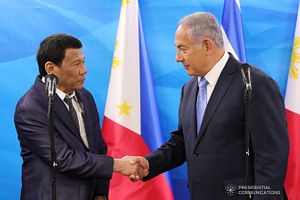Last week, indications surfaced that an Israeli firm could soon open a firearms plant in the Philippines. Though the development has already been in the works, the suggestion of future prospects in this respect nonetheless once again put the spotlight on the ongoing defense ties between the two countries.
As I have noted before in these pages, despite concerns around Duterte’s drug war and some of his perceived anti-Semitic remarks, the Philippines and Israel have been making some inroads in the defense realm. The Armed Forces of the Philippines (AFP) has placed orders for a range of equipment, including missile systems, armored personnel carriers, and radars, from several Israeli firms, and both sides have been quietly exploring ways to broaden security cooperation across several areas, including counterterrorism.
Duterte’s historic visit to Israel last month – the first by a Philippine president since the establishment of bilateral ties back in 1957 – was expected to provide an opportunity to advance ties still further. And though both governments were careful not to draw too much attention to the defense component of the visit relative to other realms, there were nonetheless some key defense developments, including the signing of six security-related agreements and engagements tied to areas such as humanitarian assistance and disaster relief (See: “Duterte Visit Spotlights Israel-Philippines Military Ties”).
One of the deals struck during Duterte’s visit was a letter of intent (LOI) between Rayo Illuminar Corp (RIC) and Israel’s Silver Shadow Advance Security Systems Ltd. (SSASS). The LOI had been focused on exploring opportunities with respect to manufacturing and refurbishment of small arms and ammunition, with an estimated cost of $50 million and the creation of 160 jobs as it got to fruition by 2019.
Last week, this deal was in the headlines again with further suggestions that there could be movement on the setting up of a new Israeli firearms plant in the Philippines. The Philippines News Agency (PNA) quoted RIC Chairman Salvador Zamora as saying in an interview that he expected Amos Golan of SSASS to be in the Philippines this month to finalize their partnership, which could see a plant operational next year.
The move itself comes as no surprise. Consultations between the two entities took place before Duterte’s visit leading up to the inking of the agreement, and it is only natural that they would occur to actually make further progress on operationalizing things now that the pact has been signed.
What this means for the actual progress of the arrangement is still unclear for now. It is still early days, and even specifics on basic fronts, such as timeline and location, have not been publicly announced. So far, Zamora’s comments only suggested that the plant would be operational by 2019 as the LOI noted, with several locations reportedly being considered for the plant including Limay, Bataan.
Moving forward, getting a sense of those sorts of details will be important to evaluate how quickly both sides can turn this agreement into reality. For now, what is clear is that one of several arrangements that Israel and the Philippines have reached to build out their defense collaboration is showing signs of continuing to move forward.































